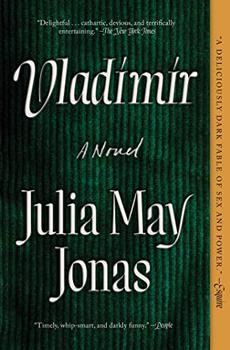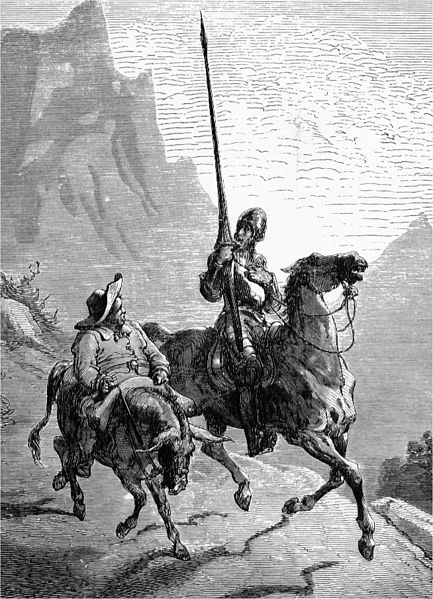Summary | Excerpt | Reading Guide | Reviews | Beyond the Book | Read-Alikes | Genres & Themes | Author Bio

Critics' Opinion:
Readers' Opinion:
First Published:
Feb 2022, 256 pages
Paperback:
Jan 2023, 256 pages
 Book Reviewed by:
Book Reviewed by:
Chloe Pfeiffer
Buy This Book
This article relates to Vladimir
 In Vladimir, Julia May Jonas's debut novel, Don Quixote is something of a minor motif. The protagonist and her husband—both English literature professors at a liberal arts college—are fans of the work and have even retraced the famous character's journey through Spain. Late in the novel, the protagonist's husband, who has been accused of sexual assault, implies that he thinks of himself as a modern Don Quixote—"an old man who refuses to see the world as it is."
In Vladimir, Julia May Jonas's debut novel, Don Quixote is something of a minor motif. The protagonist and her husband—both English literature professors at a liberal arts college—are fans of the work and have even retraced the famous character's journey through Spain. Late in the novel, the protagonist's husband, who has been accused of sexual assault, implies that he thinks of himself as a modern Don Quixote—"an old man who refuses to see the world as it is."
Don Quixote was written by Miguel de Cervantes and published in 1605. The book follows Alonso Quixano, a minor noble whose obsession with chivalric romances drives him mad—he fancies himself a knight, takes on the name Don Quixote, and travels around La Mancha in Spain with his squire, Sancho Panza, getting into adventures while on his mission to revive chivalry. Of course, he interprets his adventures differently than others do, as he's seeing them with his romance-tinted glasses: he sees chained prisoners as good men and releases them; he sees windmills as giants and tries to fight them.
Don Quixote is considered by many scholars to be the first modern novel. As Nicholas Dames points out in the Public Books 101 podcast, the romances that Don Quixote loves are stylized, conventional stories that have been around for centuries—so why don't we consider them novels? Part of the reason is that they predate modern printing. But perhaps a bigger reason is that Cervantes, in creating a character who tries and fails to live out those romance stories, showed that they didn't represent reality, that they were a fantasy—and in doing so, he created a new form that did attempt to depict reality. For many, the modern, conventional literary novel is an attempt to depict the way things really are in a certain moment in time.
The question of reality versus fantasy is also crucial to Don Quixote's importance—and timelessness—in a thematic way. In his seminal essay "Manners, Morals, and the Novel," Lionel Trilling writes, "All literature tends to be concerned with the question of reality… the old opposition between reality and appearance, between what really is and what merely seems." We often see this in novels with regards to social status and class position, or what Trilling calls snobbery; the snobbery of status is an illusion, and the work of the novel is to "record the illusion" and "penetrate to the truth which," the novel assumes, "lies hidden beneath all the false appearances." That started with Don Quixote, he argues.
The campus novel genre, of which Vladimir is firmly in the tradition, is similarly about breaking the illusion—in this case, of academia—to expose the dark or ridiculous reality underneath. Behind the lofty ideas and pretensions of the intelligentsia, the campus novel asserts, are bumbling, immoral people just waiting to be satirized. As Trilling writes, "It has been said that all philosophy is a footnote to Plato. It can be said that all prose fiction is a variation on the theme of Don Quixote."
Illustration of Don Quixote and Sancho Panza by Gustave Doré, 1863
Filed under Books and Authors
![]() This "beyond the book article" relates to Vladimir. It originally ran in March 2022 and has been updated for the
January 2023 paperback edition.
Go to magazine.
This "beyond the book article" relates to Vladimir. It originally ran in March 2022 and has been updated for the
January 2023 paperback edition.
Go to magazine.




Every good journalist has a novel in him - which is an excellent place for it.
Click Here to find out who said this, as well as discovering other famous literary quotes!
Your guide toexceptional books
BookBrowse seeks out and recommends the best in contemporary fiction and nonfiction—books that not only engage and entertain but also deepen our understanding of ourselves and the world around us.